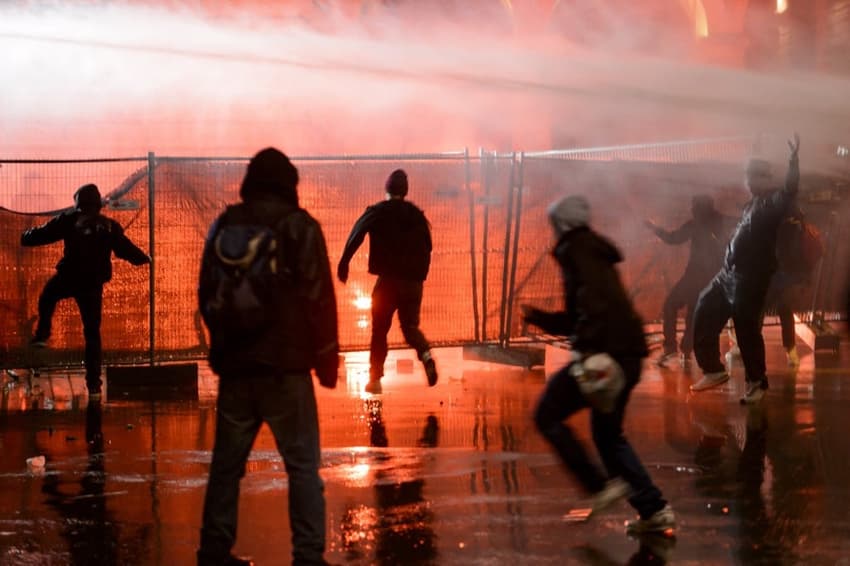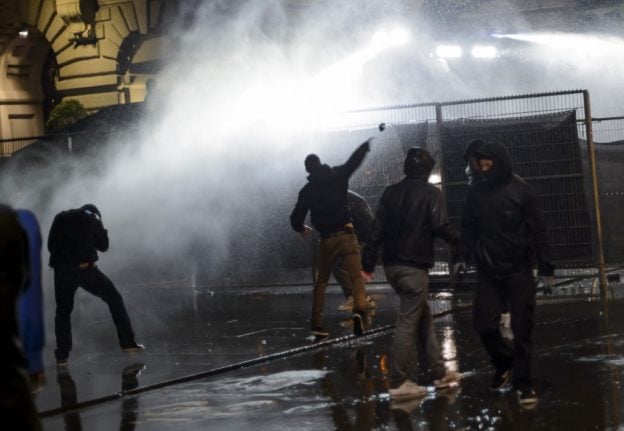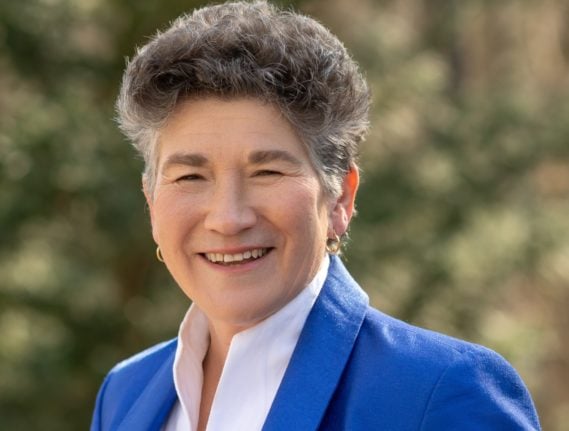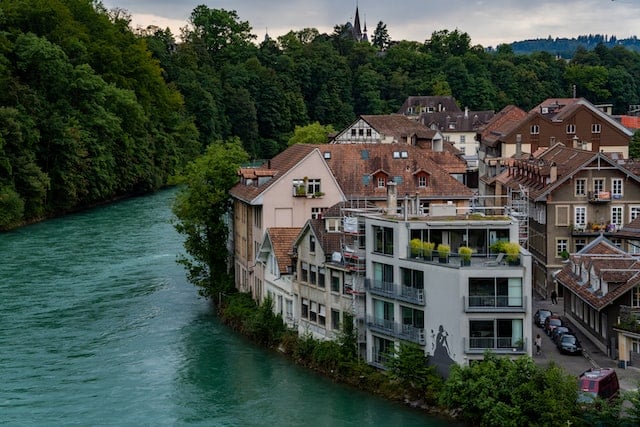INTERVIEW: 'The Swiss are not all law abiding and peaceful'

You could be forgiven for thinking the Swiss have no reason to misbehave in their land of plenty. But they do, as crime writer Kim Hays - a Swiss-US dual national - has learned from her 35 years living in Bern. Stability and order are the hallmarks of Swiss society, at least on the surface. But the many contradictions of Switzerland have provided Hays with plenty of material for her Polizei Bern series of detective novels. Hays’s first book, Pesticide, opens with a riot in the middle of Bern, and is inspired by real-life events that happened on the night of an illegal rave in 2013.
"The event, called Tanz dich frei (dance yourself free) had taken place in the Old City of Bern twice before without any trouble," Hays said.
"When it was held a third time, after the city had forbidden it because the downtown streets were dug up for an extensive construction project, it turned into a major riot. There were masked thugs fighting and injuring the police and a huge amount of property destruction and looting.”
The violence was provoked by a relatively small group of activists, referred to in Swiss media as the Black Block (Schwarzer Block). “They’re classified as radical leftists and associated with the ‘Antifa’ (anti-fascist) movement in Switzerland, but I think it’s pretty clear that they’re more interested into looting, vandalising property, and fighting the police than in politics,” Hays said.
READ ALSO: The surprising extent of petty theft in Switzerland

Members of the 'black block' in front of the Swiss House of Parliament in Bern in 2013. (Photo by Fabrice COFFRINI / AFP)'Switzerland isn't peaceful all the time'
Switzerland also has a recurring problem with sports hooliganism, which was one of the arguments for a successful popular vote in 2021 that banned face coverings in public.
As Hays commented: “Anyone who thinks all Swiss are peaceful has never seen its football hooligans in action, and anyone who thinks they’re all law-abiding doesn’t know that Swiss cities consistently show up on the shortlist of the places where the most cocaine is consumed."
When it comes to murder, the numbers are low, but Switzerland has seen gruesome crimes and even serial killers over the years. Hays has a special interest in this area, and attended the trial of an axe-murderer in the course of her book research.
In 2021, there were 226 attempted homicides in Switzerland, 42 of which ended as murders. The solution rate of all 226 crimes was 97.3 percent, which is remarkably high.
With a background in sociology, Hays is interested in the wider context. "Around three-quarters of the victims were women and children, a clear sign that domestic violence is a problem in Switzerland," she said.
“There are other types of murders as well, of course, including a serial killer who took the lives of four known child victims in the 1980s, and the case of a male nurse who went from one nursing home to another killing elderly patients, at least 22 of them. These men were caught and sentenced. Murder in Switzerland can be just as horrible as in any other country."
READ ALSO: Switzerland biker brawl - gangs clash with police ahead of trial in Bern
Born in Connecticut, Hays lived in several places, including Puerto Rico, Canada and Sweden, before settling in Switzerland. She is a self-confessed mystery-novel addict, who turned to writing later in life and is now on her third book contract with Seventh Street Books, an imprint of Start Publishing.
Switzerland could not be more different from the US when it comes to punishment for convicted criminals. “I was upset to learn that in Switzerland a ‘life sentence’ generally means 15, or in some cases as little as 10, years in prison. And even then, only premeditated murder, treason, and a very few other serious crimes receive that maximum sentence," Hays said.

Crime writer Kim Hays. Photo courtesy of Kim HaysThe emphasis in the Swiss justice system is on the likelihood of reoffending rather than using a prison term as punishment. Since 2007, all prison sentences under two years are automatically suspended, even for violent crime.
“The problem is that there have been a few well-known cases during the past decades where Swiss sexual offenders who’d been released from prison almost immediately raped and killed new victims. Short prison sentences may be humane, practical, and cheap, but they don’t protect society from dangerous criminals,” Hays said.
Switzerland has a diverse population
Hays’s characters come from different social classes and ethnic backgrounds, revealing her in-depth knowledge of the diversity of Swiss society, where one in four residents is foreign born. One of her detective duo is of Italian origin, representing one of the country’s largest immigrant groups.
"Switzerland is a country where people of different cultures rub shoulders with each other every day and where hundreds of thousands of children are binational," she said.
The murder victim in Hays’s latest book, Sons and Brothers, being published next month, is a member of the upper class of Bern who turns up dead in the Aare River. He’s part of the Burgergemeinde or community of burghers, which still owns large swathes of property in and around the city.
"The Swiss aristocracy is untitled," said Hays. "Still, their names are very well-known, because they are usually active in the government, economy, social welfare, and cultural life of their cities and cantons.
"Names like Escher and von Meiss in Zürich, Burkhardt and Merian in Basel (where the patrician families as a group are nicknamed “the dough”), Sulzer in Winterthur, Patry in Geneva, or von Fischer and von Graffenried in Bern are easily recognised in their own cities."

A view of Bern and the river. Photo by Tim Bernhard on UnsplashThough Hays is partial to a shooting or two in her fiction, fatal shootings are rare in Switzerland. This is despite the fact that most Swiss men have undergone weapons training through their military service and the gun ownership rate is one of the highest in Europe. The Bern-based writer has a theory about why this is.
"One reason that guns aren’t used surely has to do with the Swiss character," she said. "This is a country where losing your temper and confronting people, even if it’s just a matter of raising your voice, is frowned upon. That makes it all the more interesting to invent scenarios that drive ordinary people to resort to extraordinary violence."
READ ALSO: Understanding Switzerland's obsession with guns
Sons and Brothers by Kim Hays will be published in the US and Switzerland in April 2023.
Comments
See Also
Stability and order are the hallmarks of Swiss society, at least on the surface. But the many contradictions of Switzerland have provided Hays with plenty of material for her Polizei Bern series of detective novels. Hays’s first book, Pesticide, opens with a riot in the middle of Bern, and is inspired by real-life events that happened on the night of an illegal rave in 2013.
"The event, called Tanz dich frei (dance yourself free) had taken place in the Old City of Bern twice before without any trouble," Hays said.
"When it was held a third time, after the city had forbidden it because the downtown streets were dug up for an extensive construction project, it turned into a major riot. There were masked thugs fighting and injuring the police and a huge amount of property destruction and looting.”
The violence was provoked by a relatively small group of activists, referred to in Swiss media as the Black Block (Schwarzer Block). “They’re classified as radical leftists and associated with the ‘Antifa’ (anti-fascist) movement in Switzerland, but I think it’s pretty clear that they’re more interested into looting, vandalising property, and fighting the police than in politics,” Hays said.
READ ALSO: The surprising extent of petty theft in Switzerland

'Switzerland isn't peaceful all the time'
Switzerland also has a recurring problem with sports hooliganism, which was one of the arguments for a successful popular vote in 2021 that banned face coverings in public.
As Hays commented: “Anyone who thinks all Swiss are peaceful has never seen its football hooligans in action, and anyone who thinks they’re all law-abiding doesn’t know that Swiss cities consistently show up on the shortlist of the places where the most cocaine is consumed."
When it comes to murder, the numbers are low, but Switzerland has seen gruesome crimes and even serial killers over the years. Hays has a special interest in this area, and attended the trial of an axe-murderer in the course of her book research.
In 2021, there were 226 attempted homicides in Switzerland, 42 of which ended as murders. The solution rate of all 226 crimes was 97.3 percent, which is remarkably high.
With a background in sociology, Hays is interested in the wider context. "Around three-quarters of the victims were women and children, a clear sign that domestic violence is a problem in Switzerland," she said.
“There are other types of murders as well, of course, including a serial killer who took the lives of four known child victims in the 1980s, and the case of a male nurse who went from one nursing home to another killing elderly patients, at least 22 of them. These men were caught and sentenced. Murder in Switzerland can be just as horrible as in any other country."
READ ALSO: Switzerland biker brawl - gangs clash with police ahead of trial in Bern
Born in Connecticut, Hays lived in several places, including Puerto Rico, Canada and Sweden, before settling in Switzerland. She is a self-confessed mystery-novel addict, who turned to writing later in life and is now on her third book contract with Seventh Street Books, an imprint of Start Publishing.
Switzerland could not be more different from the US when it comes to punishment for convicted criminals. “I was upset to learn that in Switzerland a ‘life sentence’ generally means 15, or in some cases as little as 10, years in prison. And even then, only premeditated murder, treason, and a very few other serious crimes receive that maximum sentence," Hays said.

The emphasis in the Swiss justice system is on the likelihood of reoffending rather than using a prison term as punishment. Since 2007, all prison sentences under two years are automatically suspended, even for violent crime.
“The problem is that there have been a few well-known cases during the past decades where Swiss sexual offenders who’d been released from prison almost immediately raped and killed new victims. Short prison sentences may be humane, practical, and cheap, but they don’t protect society from dangerous criminals,” Hays said.
Switzerland has a diverse population
Hays’s characters come from different social classes and ethnic backgrounds, revealing her in-depth knowledge of the diversity of Swiss society, where one in four residents is foreign born. One of her detective duo is of Italian origin, representing one of the country’s largest immigrant groups.
"Switzerland is a country where people of different cultures rub shoulders with each other every day and where hundreds of thousands of children are binational," she said.
The murder victim in Hays’s latest book, Sons and Brothers, being published next month, is a member of the upper class of Bern who turns up dead in the Aare River. He’s part of the Burgergemeinde or community of burghers, which still owns large swathes of property in and around the city.
"The Swiss aristocracy is untitled," said Hays. "Still, their names are very well-known, because they are usually active in the government, economy, social welfare, and cultural life of their cities and cantons.
"Names like Escher and von Meiss in Zürich, Burkhardt and Merian in Basel (where the patrician families as a group are nicknamed “the dough”), Sulzer in Winterthur, Patry in Geneva, or von Fischer and von Graffenried in Bern are easily recognised in their own cities."

Though Hays is partial to a shooting or two in her fiction, fatal shootings are rare in Switzerland. This is despite the fact that most Swiss men have undergone weapons training through their military service and the gun ownership rate is one of the highest in Europe. The Bern-based writer has a theory about why this is.
"One reason that guns aren’t used surely has to do with the Swiss character," she said. "This is a country where losing your temper and confronting people, even if it’s just a matter of raising your voice, is frowned upon. That makes it all the more interesting to invent scenarios that drive ordinary people to resort to extraordinary violence."
READ ALSO: Understanding Switzerland's obsession with guns
Sons and Brothers by Kim Hays will be published in the US and Switzerland in April 2023.
Join the conversation in our comments section below. Share your own views and experience and if you have a question or suggestion for our journalists then email us at [email protected].
Please keep comments civil, constructive and on topic – and make sure to read our terms of use before getting involved.
Please log in here to leave a comment.